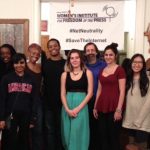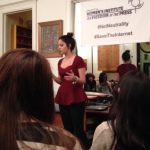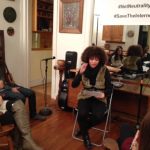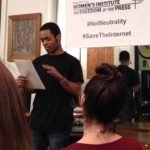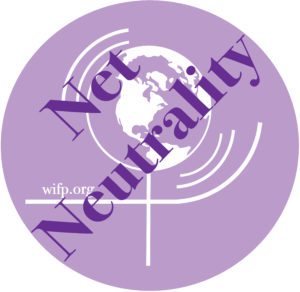Open Mic Night: A Few Photos
- Some participants
- Tanya Smith-Sreen
- Clare Verbeten
- Open Mic Night
- Sandy Somchanmavong
- Josh Hayes
Exploitation in the Name of Free Press
By Tanya Smith-Sreen, WIFP Staff
Backpage.com has faced severe backlash in response to the adult services offered on the website. The site is a classified advertising website. It also serves as a platform for prostitution and often times trafficking. It is a go-to resource for pimps and customers.
The Internet-age has revolutionized the way we communicate. The Internet is pervasive and has been integrated into every aspect of life. As such a powerful tool, the Internet also has an insidious underground network.
Backpage.com is an example of this. According to a media and consulting company, called AIM group, Backpage.com makes over $22 million from adult ads annually. It comprises over 70 percent of online prostitution advertisements in the US.
In 2010 Craigslist shut down its adult services and online prostitution advertising plummeted by 50 percent said AIM group. However, Backpage.com continues to pick up floundering business. In doing so it has not only helped these pimps stay afloat but it has also condoned the business.
Backpage.com said it should be protected under the Communications Defense Act as a neutral content provider. The company argued that it cannot be held responsible for the content others post. Yet, Backpage.com has failed in policing the site adequately.
“Backpage.com cannot hide behind protestations of being a neutral content provider and avoid its responsibility for the egregious violations of human rights from which it directly profits”, said The Coalition Against Trafficking in Women
This is not a matter of free press. Backpage.com is participating in and facilitating a much larger network of oppression by knowingly granting pimps access to a market. It is prioritizing company revenue over the lives and safety of girls today.
Prosecutors associated the company with the murders of prostitutes in Detroit, to which Backpage.com responded that the victims were advertised on at least 15 other websites. We are not playing a blame-game. Backpage.com still represents a key player in the system. To point out the failings of other institutions does not wipe the slate clean.
When did the fight to protect human life become less valuable than corporate profit? When did pointing fingers at others become a means of vindication? And when will we stop selling female bodies as a commodity in an industry that only perpetuates this image?
Banning such services on websites like Backpage.com will not target the root of the problem. But it will hamper the efforts of pimps to increase business. It will limit the access consumers have to victims of trafficking. It will incapacitate the main channel of business for prostitution.
Backpage.com is an intermediary. And at the end of the day it is just as responsible for instances of human trafficking as those directly involved. Its refusal to acknowledge liability only sustains a cycle of exploitation.
“You can’t buy a child at Wal-Mart, can you? No, but you can go to Backpage and buy me on Backpage”, said one trafficking survivor.
Backpage.com is hiding behind technicalities in the law. It is committing grave human rights abuses on a daily basis with little retribution. Justifying these violations as a freedom of the press issue represents a fundamental flaw in our system. This justification suggests individual freedom and dignity is subpar to corporate freedom. We need to stop sullying the issue of freedom of the press with gross violations of human dignity. Only then will we be able to demand justice from the companies that exploit these freedoms to rob the freedoms of others.
Under the Shadow of a Problem: Implications of My Brother’s Keeper for Communities of Color
By Elana Denise Anderson, Ph.D.
One of the most prolific scholars of the 20th century, William Edward Burghardt DuBois, was never directly asked the question, “How does it feel to be a problem?” But he remembers acutely that day in his childhood when he perceived that he was one. Today, men of color are seen not so much as a problem, but as having a problem, a problem that prevents them from succeeding in and on today’s allegedly “post-racial” American societal landscape. On Monday, September 29, 2014, at the Longworth House Office Building, a unique and viable briefing occurred that focused 0n President Barack Obama’s My Brother’s Keeper Initiative, an act that is designed to unequivocally address this issue, and many organizations are jumping on the bandwagon, embracing rhetoric that often hearkens back to the early 20th century, when gender-specific ideologies were a mainstay of the American psyche.
The briefing, titled Gendered Perspectives on Police Brutality and the My Brother’s Keeper Initiative, was paneled by a host of scholars from a variety of social policy organizations, among them the African American Policy Forum (AAPF), the National Organization of Women (NOW) and the Institute for Women’s Policy Research (IWPR). Moderated by Barbara Arwine, the President and Executive Director of the Lawyers Committee for Civil Rights Under Law, an enthusiastic public speaker who motivated the audience with the charisma of a clergyman of color, the discussion was vibrant, informative and wholly engaging. Her opening remarks were centered upon the fact that women and girls, notoriously absent from the narrative of MBK, are hidden in plain sight, and that the question begs to be asked, “what is it about women and girls of color that jeopardizes men and boys so much that they do not deserve to even be included in efforts to address the problems that plague the communities they share?” She correctly asserted that we can not wait to (re)claim the vision of racial justice that fueled the Civil Rights Movements of the mid to late 20th century.
The first to speak was the Co-Founder and Executive Director of the AAPF, Kimberlé Crenshaw, who provided background information. It was Crenshaw who stated that women and girls are beneath the shadow of the problem and that after 20 years of dialogue surrounding the intersections of social phenomena, we as a nation still do not even understand our own policed responses to the economic disparity, violence and silence that characterize the lives of women and girls of color in America and/or around the world. Her assertions about the nature of patriarchy drove home the fact that until there is more reported statistical research (even when research is conducted in communities of color, the data that is collected about women and girls is not a required submission, thereby going under-reported or not reported at all), more briefings such as this and more accuracy and equity in media coverage, the rhetoric will not change.
The only male on the panel, Marlon Peterson, was the first to mention the term hetero-patriarchy as it relates to the issues in communities of color across the nation. In his opinion, MBK misses the mark because it does not address the fact that women and girls are affected in the same ways and just as much as men and boys in their homes and communities, and that addressing the needs of half of the population in these communities will not fix the problem. Peterson was also adamant about the need for community service organizations such as The Fortune Society, of which he is the Director of Community Relations, to address the problems in communities of color more holistically by providing the same level of service for each community member regardless of their circumstances. Too, such organizations can better communicate the realities of their demographic to funders and others who offer support.
Dr. Heidi Hartmann, the President of the Institute for Women’s Policy Research provided statistical evidence that MBK is not making the case for itself through the data it presents. According to Dr. Hartmann, the initiative is based more upon the publicly accepted stereotype that boys and men of color are worse off than girls and women, and not evidence. She said, “Of the 116 statements in the report of MBK’s Task Force, only six stated that boys were worse off than girls, and the 44 indicators to be tracked apply to children indiscriminately, not just boys.” Dr. Hartmann calmly suggested renaming the initiative Our Children’s Keeper and was met with enthusiastic applause.
Lisalyn Jacobs, the Vice President for Government Relations of Legal Momentum, is the single mother of a six-year old son. In her brief statement about the criminalization of the single mother of color she suggested, and rightly so, that the perpetuation or even the advocacy of the idea that men and boys of color are having a unique experience of oppression is just wrong. The President of the United States, raised by a single mother, claimed to be able to relate to the needs of men and boys of color primarily because he grew up without a father in his home. Again, the strange bedfellows of anti-racism and patriarchy raise heads. Single parents of color, be they mothers or fathers do not have some kind of personal failing or shortcoming; they struggle because of economic disparity that is a direct result of racism in the United States. The fact that the majority of men and boys of color may have been raised by a single mother is NOT the reason for their lack of opportunity, education and support, an idea propagated by Daniel Patrick Moynihan in his infamous 1965 report on the Black family. Does MBK continue to blame the victim, namely single mothers of color, for the plight of men and boys of color?
Finally, Terry O’Neill, the President of the National Organization of Women, correlated MBK with the idea that the father-centered family should continue to be a mainstay of American society. “It is a fantasy that”, she said, “like a zombie, will continue to eat people’s brains”. The idea that everything will be fine if we, as Americans, will blindly accept the gender-specific ideas of the past that encourage men and women to behave in certain ways simply because they are men and women is dangerous and offensive. All “isms” – racism and sexism included – must come to an end if we can hope to move forward as a society.
Communities of color suffer from a range of disparities and issues that are often characterized by gender, race and sex, but rarely are economics a part of the conversation. If MBK intends to provide education, employment and mentorship opportunities for half of the populations in these communities, will not America simply be doing what it has always done-attempting to address symptoms without fully addressing the problem? Racism and sexism have long cast a dark shadow over American society. Women and girls, regardless of color, have always been behind, under or trapped within it. Until the voices of women and girls are heard clearly by those who most consistently affect the circumstances of the majority of American lives (still men), they will continue to be considered but an irrelevant whisper, drowned out by the chorus of social construction.
Elana Denise Anderson, Ph.D., is the Associate Director of WIFP.
 The Women’s Institute for Freedom of the Press
The Women’s Institute for Freedom of the Press